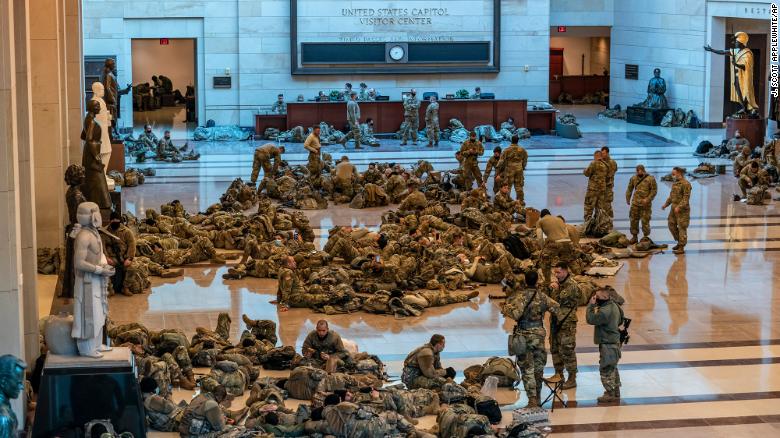Washington, DC, and states across the country are heightening security and preparing reinforcements this week ahead of potential armed protests from Saturday up to at least Inauguration Day on Wednesday.
One week after a pro-Trump mob ransacked the US Capitol, federal officials reiterated a warning in a call with law enforcement leaders across the country, saying they remain concerned about the prospect of extremists appearing at planned rallies and conducting violence.
Security is also ramping up in battleground states that were crucial to President-elect Joe Biden’s presidential victory, with governors activating the National Guard, closing capitols, erecting fences and barriers and, in at least two cases, boarding up windows.
FBI Director Christopher Wray said Thursday that authorities are “tracking calls for potential armed protests and activity leading up to the inauguration.”
“We’re monitoring all incoming leads — whether calls for armed protests, potential threats that grow out of the January 6th breach of the Capitol, or other kinds of potential threats leading up to inaugural events and various other targets,” Wray said.
It all adds up to an inauguration unlike any other, with no crowds in DC and security to the maximum across the country.
How DC is preparing

A week after the pro-Trump mob stormed the US Capitol, the area around Capitol Hill is under strict security. Members of the National Guard were present all around, including inside the Capitol, and new fencing blocked off the perimeter of the area.
DC Police Chief Robert Contee said on Wednesday that more than 20,000 National Guard members could be expected in the District for Biden’s inauguration, though he noted the final numbers will be provided by the US Secret Service.
The officials added that there is no concern that there will be any shortage of Guard forces to meet requirements from the 50 States and the District of Columbia.
Contee told reporters he remains concerned amid a “major security threat” ahead of the inauguration and planned demonstrations in the District this weekend.
“I’ve been concerned before today and will be through this weekend, and beyond,” Contee said on Wednesday.
He also praised DC Mayor Muriel Bowser’s security posture, including discouraging people from coming to DC for the inauguration.
“There’s a major security threat, and we are working to mitigate those threats,” he added.
Bowser said Wednesday she was trying to convince the US Department of the Interior Secretary David Bernhardt to cancel public gathering permits and deny future applications during the period through the inauguration.
How states are preparing
States across the country are enhancing security and calling in the National Guard to protect Capitol buildings ahead of the possible protests, including in California, Connecticut, Georgia, Kentucky, Massachusetts, Minnesota, Ohio, Oregon, Pennsylvania, Virginia, Washington and Wisconsin.
A number of states are deploying heavy fencing and additional crowd control measures around their Capitol buildings, including in Arizona, California, Georgia, Michigan, New Mexico, Virginia and Washington, while Pennsylvania has built barriers and increased security.
Although many Capitol buildings are closed due to coronavirus restrictions, the warnings are particularly fraught in states that allow people to openly carry firearms and those where Trump has falsely claimed fraud.
n Michigan, where heavily armed demonstrators jammed inside the state Capitol in Lansing in the spring, the open carry of firearms was banned inside the building. Still, Lansing’s mayor has asked the governor to call up the National Guard to protect the Capitol, and the state attorney general said that the state’s new open-carry firearms ban there is not enough.
“The state capitol is not safe,” attorney general Dana Nessel said.
In Virginia, a state of emergency has been declared in Richmond and Capitol Square will be closed ahead of anticipated protests at the state Capitol building. The state is anticipating a gathering Monday for “Lobby Day,” an annual protest event that last year brought thousands of gun rights advocates to the Capitol.
Governors in Utah and New Mexico also declared states of emergency.
In Oregon, the FBI has set up a command post to gather and share intelligence with law enforcement on potential threats of violence to the state Capitol.
In Florida and Oklahoma, lawmakers and staff are being told to work from home this weekend due to the likelihood of protests. Pennsylvania and Utah are closing their capitols altogether. In Wisconsin and Virginia, workers have boarded up their Capitol’s first-floor windows ahead of potential protests.
Several big states are also on high alert. In New York, state police have taken steps “to harden security in and around the State Capitol in Albany” ahead of Biden’s inauguration. And in California, more than 1,000 National Guard troops have been deployed and fencing has been erected around the Capitol after what the governor called an “unconscionable assault on our Republic.”

































